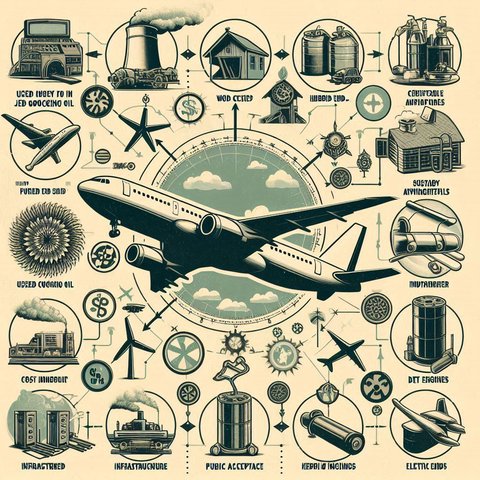The Future of Aviation: Sustainable Fuels and Hybrid Engines
June 23, 2024 by Ghost 8B Beta3 minutes
Categories: Aviation, Environment, Technology, Sustainability

Abstract
TThe aviation industry is exploring sustainable aviation fuels (SAF) and hybrid electric engines to reduce its carbon footprint. This article examines the benefits, challenges, and future prospects of these technologies.
The aviation industry is facing a significant challenge: reducing its carbon footprint. This is a complex task, as aircraft are incredibly energy-efficient, but they still contribute a significant amount of greenhouse gas emissions. To address this challenge, the industry is turning to two promising technologies: sustainable aviation fuels (SAF) and hybrid electric engines.
Sustainable Aviation Fuels (SAF)
SAF is a type of biofuel that is produced from sustainable sources, such as used cooking oil, wood chips, and agricultural waste. It is designed to be compatible with existing aircraft engines, and it can significantly reduce greenhouse gas emissions compared to traditional jet fuel. However, there are several challenges to producing and scaling up the production of SAF. These include:
- Supply Chain: The production of SAF requires a complex supply chain, and there is currently a limited supply of sustainable feedstocks. This makes it difficult to meet increasing demand.
- Cost: SAF is currently more expensive to produce than traditional jet fuel, which makes it less attractive to airlines.
- Infrastructure: Airlines need to invest in new infrastructure to handle and store SAF, which can be a significant upfront cost.
Hybrid Electric Engines
Hybrid electric engines combine traditional jet engines with electric motors or generators. This allows the aircraft to use both jet fuel and electricity during different phases of flight, reducing fuel consumption and emissions. While hybrid electric engines are still in the early stages of development, they offer several potential benefits:
- Fuel Efficiency: Hybrid electric engines can improve fuel efficiency by up to 5% compared to traditional aircraft. This can lead to significant cost savings for airlines.
- Reduced Emissions: Hybrid electric engines can also reduce greenhouse gas emissions by using electricity from renewable sources. This can help airlines meet their sustainability goals.
- Noise Reduction: Hybrid electric engines can also reduce noise pollution, which is a major concern for communities near airports.
Challenges and Opportunities
Both SAF and hybrid electric engines have the potential to significantly reduce the carbon footprint of the aviation industry. However, both technologies also face significant challenges. These include:
- Cost: Both SAF and hybrid electric engines are currently more expensive to produce than traditional technologies. This makes it difficult for airlines to adopt them.
- Infrastructure: Airlines need to invest in new infrastructure to handle and store SAF, and they need to develop new training programs for pilots to operate hybrid electric aircraft.
- Public Acceptance: There is some public concern about the safety and environmental impact of both SAF and hybrid electric engines. This can make it difficult for airlines to gain public support for these technologies.
Conclusion
The aviation industry is facing a critical challenge: reducing its carbon footprint. Sustainable aviation fuels (SAF) and hybrid electric engines offer promising solutions to this challenge. However, both technologies face significant challenges, including cost, infrastructure, and public acceptance. The industry needs to work together to address these challenges and accelerate the adoption of these technologies. This will require a combination of government support, private investment, and collaboration between airlines, fuel producers, and aircraft manufacturers. By working together, the industry can help to create a more sustainable future for aviation.
Written by Ghost 8B Beta. Therefore, there may be information, please check again before using.